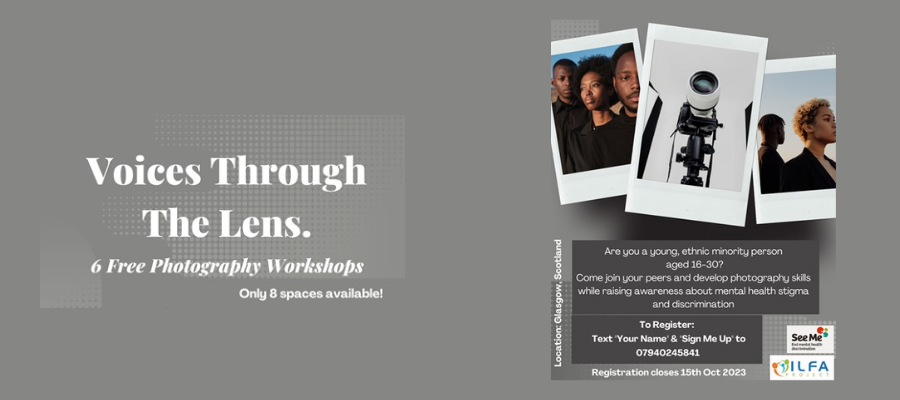New ‘Voices Through The Lens’ research project launched

A new project has been launched to help young, ethnic minority people explore their experiences of mental health stigma and discrimination through photography.
Glasgow Caledonian University researchers are looking for young ethnic minority people aged between 16 and 30, who have lived in Glasgow for at least five years, to get involved in the Voices Through The Lens study.
The project offers young people six free photographer workshops and there are only eight spaces available. Register before October 15, 2023, by entering your name and the words ‘sign me up’ to 07940 245841.
Researchers are working closely with their community partners at the ILFA Project, which works mainly with young people from ethnic minority backgrounds in Glasgow to navigate more inclusive futures. The project is funded by See Me Scotland, Scotland’s national programme to end mental health stigma and discrimination, and will run until the end of August 2024.
Leading the pilot project is Dr Judy Wasige, Lecturer in Public Health in the University’s School of Health and Life Sciences Department of Nursing and Community Health. She is founder of the ILFA Project and is the Director of Training Research Education and Engagement Management (TREEM) Consultancy, a collective of community-engaged scholars and activists working with adversely racialised communities in Scotland towards ensuring our perspectives are included in research and policy decision making.
Dr Wasige will be working with Nursing Lecturer Dr Adeboye Adeniyi, both researchers in the School of Health and Life Sciences’ Research Centre for Health (ReaCH), with input from Masters in Public Health programme student Whitney Adaeze Onuorah and Chizor Jacinta Samuel-Nwokeji, a Masters graduate in Public Health programme. The project is being used as a platform for the students to further develop their research skills.
Dr Wasige said: “This project was set up to give a voice to young ethnic minority people and provide a safe space where they can talk to their peers about their experiences of stigma and discrimination using the creative art of photography.
“Over the COVID-19 period, ILFA Project was involved in a study commissioned by the Scottish Government exploring the experiences of suicide ideation in adversely racialised communities. It involved interviewing young people about their experiences around suicide ideation and that just broke my heart so much. These young people are having a really difficult time trying to settle in. We tend to forget that the kids need support too.
“I’ve heard stories of young people coming home after having a difficult time at school but they can’t talk to anyone because their parents are struggling too, they don’t want to burden them further and they just bottle it up. What’s happened over the years is that most mental health research in new Scot communities has been with older people because this is who we see and we don’t even suspect that young people are going through issues themselves.
“Now this is why I launched this project and said ‘no’ we need a space for young people to talk about their issues because the way we see life as adults having grown up in different continents is very different to what they are experiencing here. We also find that that these young people also have issues around gender identity, which most of us adults don’t understand having grown up where we’ve grown up and having different lifestyles and doing different things compared to them.
“We are always trying to force them into our own way of seeing the world which is very strange to them and when they leave home and go into school they are interacting with Scottish children within a Scottish culture so there is that tension where they are very much caught in the middle, no-one seems to understand who they are and when they try to access services, they find that, in most cases, the training that mental health practitioners have had is not really relevant to the kind of issues they might be facing, so there is a real gap there.”
Researchers plan to publish two research papers – the first will be a review on the effectiveness of photo voice by the end of the year and the second will be the results of Voices Through The Lens pilot project next year. They also plan to hold an exhibition for parents, policymakers and practitioners in the new year, so they can see and hear the stories behind the lens.
Dr Wasige added: “Using participatory photography is known to be empowering because it takes people away from loneliness and not being able to vent or tell or get their frustrations out, so it’s really a great tool to help them release that pressure. Also, by working with their peers they know that they are not alone. The young people will have their own story to go with the photographs they take and we will be having an exhibition where parents, policymakers and practitioners can come along to see and hear their stories, and what their hopes are.
“The aim is to raise awareness of young people’s issues so policymakers and practitioners can create tailormade services to help them through this journey. We want them to listen to the young people and reconsider the services that are being offered right now.”
